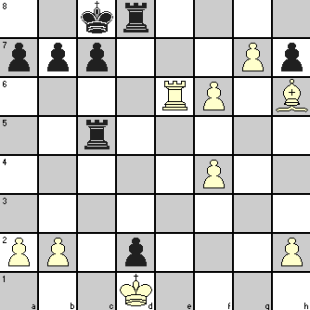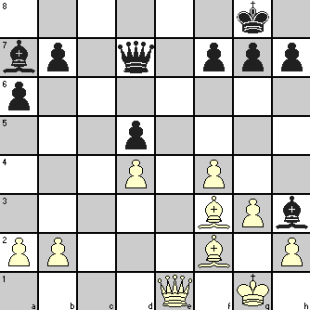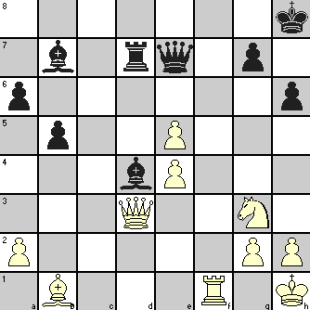Have you ever lost a chess game which you should have won? We are not asking about some elaborate chess combination that you could not calculate properly nor about any gross oversight which forced you to capitulate. Rather, we are talking of inability to see a resource that would have completely turned the table in your favor. Though in Chess tactics: Some days are really not yours! we have shown some errors of judgment even at top levels, what we are discussing below are different from such cases.
In all the three examples, the player who resigned was convinced that his position was hopeless. But later analysis showed that if he made a particular move in that apparently lost position, he would have surely won the game!

The above position was reached in a simultaneous display by a GM playing as White. Both players had passed pawns on the respective 7th rank. It was White’s turn to play but he thought that while Black’s Rook at d8 prevented his pawn promotion, he had no defense against Black’s threat of … Rc1+ followed by … d1=Q+. He therefore resigned without making any move.
He did not realize that he had a winning move in Rd6!
| 1. | Rd6! | Rxd6 | White was threatening to capture that all important Black pawn and Black had to capture with his Rook |
||
| 2. | g8=Q+ | It is White who first gets to promote his pawn with check! |
All White needed now was to maneuver the Queen to capture one of the Rooks and Black would not be able to promote his pawn. White could then push his f-pawn and Black would have to give up his other Rook to prevent this pawn promotion. White King would capture Black’s d-pawn and with the help of the Bishop would be able to promote one of his remaining pawns to win the game!

This was the position after 23 moves in a game played out between a GM (with white pieces) and an IM (with black pieces). See what happened next.
| 24. | Bxd5 | h6 | Black could not capture the Bishop because of the threat 25. Qe8# | ||
| 25. | Qe4 | Qb5 | White now realized that he was facing a threat of checkmate (26. … Qf1#) against which he could not find any defense! 26. Qe1 Qxd5 would allow Black to play 27. … Qg2#. So White decided to resign without making any move. White was possibly blinded by this sudden threat to miss the simple defensive resource of 26. Kh1! After 26. … Qf1+ 27. Bg1, Black had no more threats and White had a better chance to win because of his extra passed pawn. |

White had the move in this position after 34 moves in a game between two fairly strong players. The motif here is somewhat similar to the above. Only, here Black thought that he was losing material after White’s 36th move and resigned. Fact is, he had an opportunity to attack and gain enough material to force a win!
| 35. | Nf5 | Qxe5 | |||
| 36. | Rd1 | Resigns | It looked to Black that he was going to lose his KB. In fact, it would be White who would lose material if Black played 36. … Bg1 with the threat of 37. … Qxh2#. After that, it would be either 37. Qg3 Rxd1 38. Qxe5 Bd4# or 37. Kxg1 Rxd3 38. Bxd3 Bxe4 39. Bxe4 Qxe4 with an easy win |
We hope the above examples will help you to realize that a battle is not lost till your opponent has won it! In a difficult situation, examine all possibilities however futile they may look. Think of giving up only when you are certain that you have explored all avenues and failed to find an escape route.


5 Comments
Very interesting post and topic to discuss, as the great saying goes in chess. The most difficult thing in chess is to win a winning position.
“I love all positions. Give me a difficult positional game, I will play it.
But totally won positions, I cannot stand them”
(Hein Donner)
Nothing can make me more excited about Chess than when I can see those little beautiful moves that win a whole game, but nothing can turn me down as losing and finding out later that I could totally have won the game! Haha!
But it makes the game what it is!
@jpmelos
That is the beauty of the game! It never ceases to bring out new surprises!
@GambitQueen
Thanks for the comment and the quote.
@jp it happens in chess and that is what i love about this great game of chess.
@GambitQueen – True indeed.